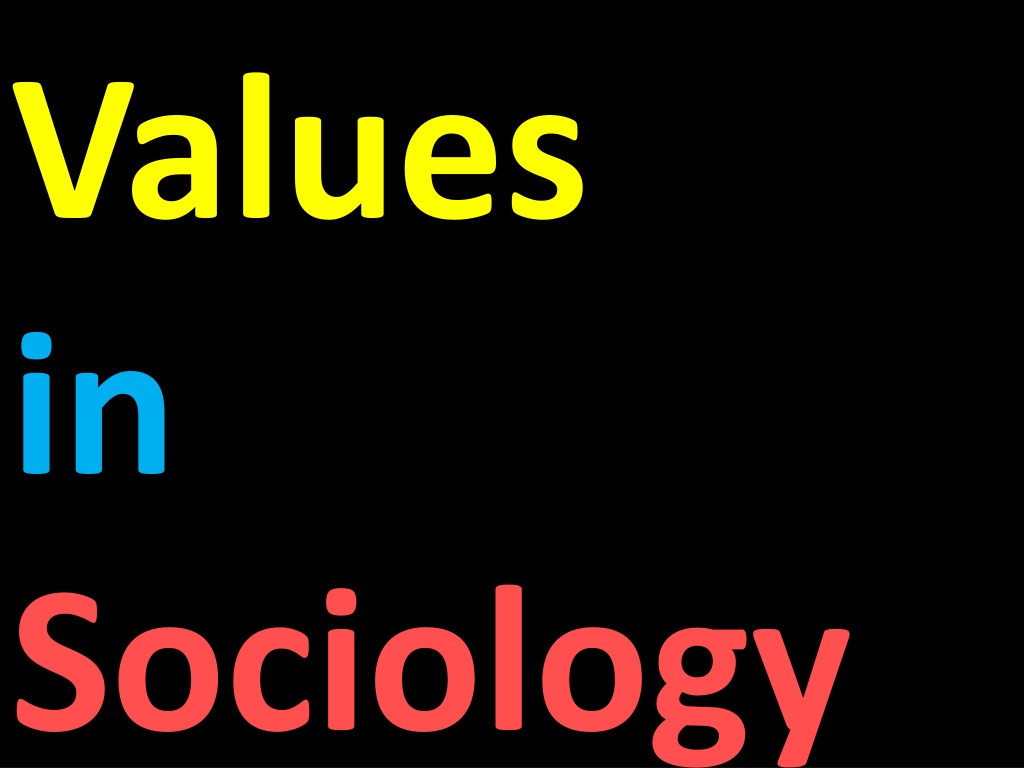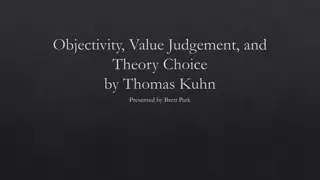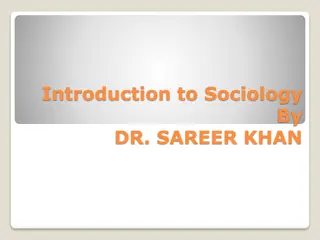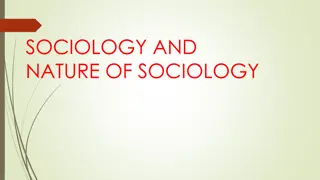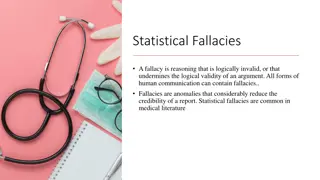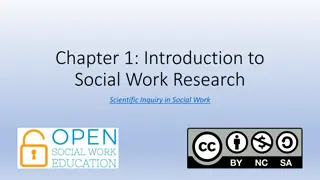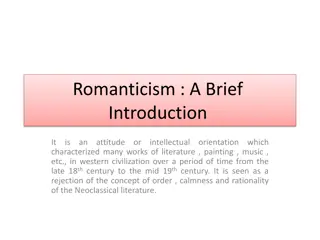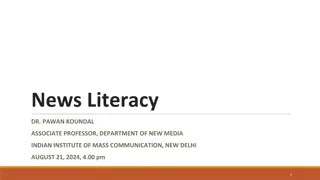Exploring Values in Sociology: A Critical Analysis of Objectivity and Subjectivity
Delve into the complex interplay between objectivity and subjectivity in sociology, examining whether true value-free research is achievable. Classical sociologists like Comte, Durkheim, and Marx are scrutinized for their perspectives on the role of values in sociological inquiry, challenging the notion of a completely objective approach. The debate on the impact of values on sociological research is dissected, highlighting the nuances of studying society through different lenses.
Download Presentation

Please find below an Image/Link to download the presentation.
The content on the website is provided AS IS for your information and personal use only. It may not be sold, licensed, or shared on other websites without obtaining consent from the author. Download presentation by click this link. If you encounter any issues during the download, it is possible that the publisher has removed the file from their server.
E N D
Presentation Transcript
Values in Sociology
Start: Key Terms Value- freedom Subjective Objective Value- laden Value- committed
Essay Questions 1. Assess whether Sociology can or should ever be value-free? (33 marks) 2. Assess whether Sociology is able to overcome the problem of values? 3. Value-free Sociology is a myth? Discuss.
Positivists Positivists argue that society (and therefore individuals) can be studied objectively & scientifically. This approach assumes that the researcher can remain fully objective and detached from their research. This approach however can be accused of ignoring the fact that all individuals have values feelings, thoughts, emotions, preferences & prejudices. This topic therefore asks the questions; can sociological research ever be truly objective? And can values actually have a positive effect in the research process?
Classical Sociology & Values: Classical Sociology refers to sociology in it s earliest forms & examines Classical Sociologists such as Comte, Durkheim, Marx & Weber. http://t1.gstatic.com/images?q=tbn:N_sp4G16JRZXdM:http://levine.sscnet.ucla.edu/images/max_weber.jpg http://t0.gstatic.com/images?q=tbn:V160lCaxKDHsSM:http://www94.homepage.villanova.edu/peter.knapp/Marx.gif http://t1.gstatic.com/images?q=tbn:eF19gkBZCaNNJM:http://www.phillwebb.net/Topics/Society/Durkheim/Durkheim2.jpg http://t3.gstatic.com/images?q=tbn:cttTfRxsGnkmsM:http://www.apeuropeanlahs.org/resources/ModernEuropeanThought_files/comte.jpg Comte & Durkheim can without a doubt be labelled as positivists in the truest sense in that they both share the Enlightenment view that a better society can be produced by studying it in an objective, value-free, scientific & systematic manner (Social Facts)
They argue that the sociologists job is to uncover truths & laws of society that govern its proper functioning. Preferring objectivity & value- freedom meant, Comte & Durkheim argue that the sociologist is free from values & bias & thus in a perfect position to suggest what is best for society. This viewpoint almost positions sociologists as the doctors of society. Comte saw sociologists as latter-day priests of the new scientific religion of truth .
Karl Marx Generally speaking, Marx favours a scientific approach to the study of society & is thus usually classified as a Positivist sociologist along with Comte & Durkheim. However, Marx did talk about Values in his work (making his view of Society Value- Laden & non-scientific). Marx values the strengths of Communism, taking for granted that it is Ideal i.e. this is not an objective approach but it is central to Marxist Theory.
What about Weber and values? http://t1.gstatic.com/images?q=tbn:N_sp4G16JRZXdM:http://levine.sscnet.ucla.edu/images/max_weber.jpg
Max Weber Although Weber is, generally speaking, a contemporary of Comte, Durkheim & Marx, he broke the mould of this dominant Positivist- Value-Free approach by arguing that Values are actually very important to Sociological research. In taking this different approach to society, Weber laid the foundations for Social Action theories of society (as opposed to Structural Theories of society) i.e. Interpretivism & Symbolic Interactionism
Weber argues that Social Facts cannot tell us how society should work. Values tell us this information. E.g. Positivism can tell us that there are more divorces BUT this does not mean that people do not value marriage. Interpretivist methods can get to the bottom of WHY people divorce, or WHY they stay married. It could be argued that divorce is too easy, that marriage should be harder to obtain, that marriage is pointless etc .. Society is built on different Value-Judgements NOT Predictable Social Facts.
This ultimately means that the scientific, value-free study of social facts is not particularly useful in studying society. instead; to understand society we need to understand the subjective, value-laden opinions, thoughts, emotions and meanings of individuals. For a PRIZE Weber called this VERSTEHEN (to understand)
Values can guide research It is impossible to fully understand society just by collecting meaningless, statistical Social Facts . Instead the sociologist should pick out the most important areas to examine in a Qualitative, Specific, Micro manner. According to Weber, Sociologists could use positivist statistics to inform their choices of topic Wow, the suicide rate is rocketing! But ultimately the choice of topic fully depends on the importance of the topic to the researcher and/ or the funders of the research My brother committed suicide, and the government want to cut the male suicide rate All research is Value-Relevant / Value-Driven & therefore unavoidably Value-Laden.
Anti-Minotaur: The Myth of a Value- Free Sociology, Alvin W. Gouldner
Gunnar Myrdal Total objectivity is an illusion which can never be achieved. Because all research is guided by certain viewpoints and view points involve subjectivity. Subjectivity creeps in at various stages in the course of sociological research. The very choice of topic is influenced by personal preferences and ideological biases of the researcher. Not possible or desirable to keep values out. Sociologists should openly take sides.
Howard S. Becker (1967) Whose Side Are We On? To have values or not to have values: the question is always with us. When sociologists undertake to study problems that have relevance to the world we live in, they find themselves caught in a crossfire. Some urge them not to take sides, to be neutral and do research that is technically correct and value free. Others tell them their work is shallow and useless if it does not express a deep commitment to a value position.
Killer Conclusion Real world Sociology acknowledges the problem of values but engages in social research to try and explain society.
Essay Questions 1. Assess whether Sociology can or should ever be value-free? (33 marks) 2. Assess whether Sociology is able to overcome the problem of values? 3. Value-free Sociology is a myth? Discuss.
